- Home
- Chuck Wendig
Vultures Page 2
Vultures Read online
Page 2
Psst. Psssh. Sshhhht.
There. Done.
Ahhhh.
Miriam stands, wipes, flushes, washes, and manages to shimmy her way back out of the room, where the bartender awaits.
“You some kind of detective?” the bartender asks. Maybe not an odd question, but an ill-timed one, given that Miriam emerges victorious from an epic pee session, and it rather takes her off guard.
“What? Do I look like a detective?”
“You said you’re here because of the Starfucker. Taylor Bowman have something to do with that?” The lady’s eyes narrow.
“I think so. I think he might be a victim.”
“You think he’s dead?”
“Going to die.”
“Huh.” The bartender resumes her walk toward the door at the end of the hall, but when she gets there, she pauses, hand on the knob. “What they say, is it true? About the Starfucker? With the faces?”
“True as the teeth marks in my bedposts.” The bartender gives her a look at that; Miriam ignores it. “He cuts off their faces. While they’re still alive, of course, so he can show the mask he’s taken from them. That’s what he calls it. The mask. Sometimes, he says some fancy-pants bullshit about vanity and narcissism and self-image as he removes the face, always with a skinning knife—a Ka-Bar blade with a gut hook at the top. He’s meticulous and effective. He holds the face up like it’s a . . . hot towel a barber might slap on the face of a freshly shaved fella. He shows it to the victim, always a celebrity, though also always some Z-grade celebrity or some young up-and-comer. Then he uses that gut hook to rip out their middle. One pull across, unzipping them like a suitcase. Their guts spill out. He gingerly pats the face back onto their wet, red skulls—pat, pat, pat, like he’s slapping the sauce onto a circle of pizza dough. Then he walks away. They die slow.”
The bartender blanches. “You seem to know a lot about this.”
“Could be a hunch.” She shrugs. “Or hey, maybe I’m the killer.”
“Maybe you are. Or maybe I am.”
Miriam elevates her eyebrows in a gesture of yeah yeah, anything can be anything, whatever, can we just get on with this? At least, that’s the message she hopes her face conveys.
The bartender opens the door.
Miriam steps through, into darkness. The bartender reaches behind her, flips a light switch, but already in the half-dark Miriam sees a figure in the room, a man sitting bound to an office chair—a chair that looks familiar, in front of a familiar desk. The man, too, is familiar. . . .
Lights on. Taylor Bowman’s panic-stricken face lights up like a spotlight as he sees her. Behind the swaddling of duct tape around his mouth, a scream lies trapped, muffled there behind the gag. He struggles in the chair, hands and feet similarly affixed with duct tape.
Oh, shit.
One of the bartender’s arms wraps around her throat, closing tight as the woman’s other arm braces it tighter—
Fifteen years from now, a different place. Cold, wet, pine trees standing around. The bartender is older, heavier, bundled up in layers of rain jacket. Hood, no umbrella. She stands in front of a gravestone in a cemetery, the rain going now from a pissy drizzle to a hammerfall, and she says to the grave, “Sorry, Dad. I miss you. I’ll be seeing you soon, though. It’s my time. And you can’t change that.” Then she peels off one layer of a coat, and then the sweater underneath, until her inked arms are revealed and bare to the rain. The tumors inside her are thick and fibrous, but they won’t take her, not today, because the straight razor in her hand is eager to do its work, and it does—two lines slashed vertically, one down each arm, from the wrist to the bend of the elbow, fsshht, fsshht, each arm like a gutted fish, and the woman sits, leaning back against her father’s headstone, and the rain pulls the blood from her, washing it to the ground, as she dies.
—it’s a blood choke, a carotid restraint, a mean-ass sleeper hold. It’s a good one. Miriam’s not ready for it. Her vision wobbles in and out, blackness spreading in from the edges of her vision like motor oil. She stomps a foot down, but the bartender, she’s well placed and well braced. Miriam struggles like hell. She cranes her neck to the side, cheek against the tattooed arm—her mouth cranes open, her jaw crackling—
Chomp. She bites down hard. Teeth sinking into inked skin. Blood wells up around her mouth, down her chin, down the woman’s arm. But still the woman is undeterred—
Miriam’s heels begin to judder against the floor.
The baby, please—
She doesn’t know what the resultant hypoxia would do to the child inside her, but already she wonders, could this be the thing that kills it in three more months? One bad injury now leading to a troubled birth? If I can’t get oxygen, the baby can’t get oxygen . . .
“Hold . . . still . . . ,” the bartender says.
“Nnngh,” Miriam grunts, the darkness now a living thing, reaching up and pulling her down, down, down. As it does, she sees something on the woman’s arm—a familiar tattoo that had been lost amongst the others. Miriam didn’t see it before, but now it’s there, and she focuses on it—
A spider.
Black, with a white circle on its back, in the circle three lines spinning out from the center.
Once seen on a playing card handed to a man named Ethan Key as he died. Handed to him by his killer.
Destinare . . .
Nona, decima, morta . . .
“P-please,” Miriam says.
But it’s too late.
The blood choke does its job.
Her head is light as a balloon (red balloon), and it seems to float away from her, drifting higher and higher until suddenly it pops—ploink!—and down she plunges, down, down, down, falling fast into the black.
PART TWO
* * *
NO TRESPASSING
FOUR
Fuck Fuck Fuck Fuck
THEN.
The train of thought inside her head is long and fast, an iron beast black as the devil’s own spit, traveling in circles and spirals, the lead locomotive passing its own caboose time and time again. I can’t be pregnant, Miriam thinks as the ambulance drops a wheel into another pothole on its way to the highway. I can’t be pregnant. I can’t be pregnant. Choo-choo. Bang and judder, thump and shudder. The chain between the restraints binding her wrists rattles against the metal cuffs. I can’t be. The doctors told me my insides were ruined. She envisions her innards like they’ve been run across a cheese grater: red, pulpy curls everywhere like blood-soaked pencil shavings. I can’t be pregnant. I can’t be a mother. It’s not physically possible, and it’s not intellectually emotionally spiritually possible, either. If there is even a teeny-tiny modicum of justice in this universe, it cannot—will not—let me be a mother.
But of course, that’s where this train is heading, isn’t it?
It pulls into the station of a single conclusion:
A modicum of justice? It doesn’t exist. Not in a sliver, not in a splinter, not in a mote or molecule. The universe is unjust.
It is unfair as fuck.
There exists no cosmic balancing force, no great ledger where all the debts and credits are neatly squared, no scale in the hands of a blind lady.
And so, as the universe is a boldly unreasonable place, she decides that what she believes couldn’t be real is in fact Very Goddamn Real:
Miriam Black is pregnant.
Louis gave her this child, and then he died. Shot by Wren in a cabin she once imagined was her escape from the world: a precious snow globe kept separate from the rest of life’s uncomfortable grievances. Now Wren is gone, Louis is dead, so is his one-time bride, and so too is the vicious human carcinoma, Harriet—Harriet, who only died once Miriam cut open her chest and ate her heart. Because apparently, that’s a thing.
And now, Miriam is pregnant.
It is the only explanation. She stood there under the shower spray in the police station here in backwater Pennsyltucky, and as she stepped out, she received a death vision
like no other: a vision that swept up across her without ever having to touch another person. But she is touching someone, isn’t she? A flicker of humanity inside her—not alive, not aware, not yet, not really, but for fate’s purposes, that is enough, for the baby’s fate is already signed, sealed, and delivered. All of time cast not in a line but balanced in a bundle of moments on the head of a pin, and in that bundle is a moment like any other, a moment she wouldn’t or shouldn’t give a hot red fuck about—a child dying upon birth, nine months after conception. Great, so what, that’s life, that’s the world, infant mortality is a thing and it’s not her problem. Except it is. This is her circus, this is her monkey, her little baby monkey.
An impossible child, unable to be born.
Dead before it reaches the light.
Again, she thinks.
The cop here in the ambulance with her is Bootbrush—turns out, his name is Stuckey. Sergeant Abe Stuckey, in fact, though she still thinks of him as Bootbrush because of that black broom mustache hanging under his nose. He’s watching her not like a hawk regarding its prey, but rather like a dog trying to understand an octopus. He regards her as if she’s an alien: some otherworldly thing cast into his care for a short time.
The ambulance takes another bounce. She nearly falls off the white metal bench they have her seated upon. The ambulance driver is the only paramedic present. At this time of night, and so close to the holiday, they only had this one guy to spare. So, Bootbrush is along for the ride.
“I’m pregnant,” she blurts out. Bootbrush looks at her, his face scrunching up so that his mouth is suddenly gone underneath the bristles of his mustache. He doesn’t say anything, so she keeps filling the silence because what else is there to do? It’s better than living inside her head, which is a toxic shitty pit if ever there was one. “I’m pregnant and I don’t know what to do. I shouldn’t be pregnant. I can’t be.”
Bootbrush just offers a conciliatory shrug. It’s obvious this whole thing is making him uncomfortable. Finally he says, “I’m sure you’ll figure it out.” Even though he knows she won’t. There’s nothing to figure out. She’s pregnant, handcuffed, and almost surely headed to prison for—well, for whatever it is she did and whatever it is they think she did.
Except—
What if that’s why the baby dies?
What if the baby dies because she is going to jail, and the conditions in prison are deplorable enough to significantly up the chances of the baby’s mortality? Or maybe they just rip the damn thing out of her on the eve of her execution, because they’ll probably kill her, right? They think she beheaded an ex-FBI officer: her ally, Grosky. Not to mention the tally of Wren’s crimes she’s already loosely confessed to committing. What have I done?
But maybe it’s the other way: maybe she slips this noose and that’s why the baby dies. Out there, on the run, can’t get care, only finds some backwoods veterinarian to deliver the baby—some hick used to castrating horses or expressing the anal glands of sheepdogs, and here he goes, rupturing the poor kid’s brainpan with a pair of ugly tongs usually used to grab a calf’s head out of its mother’s birth canal.
Though none of this matters anyway, does it? Because her powers work one way and one way only:
She sees death. A touch is all it takes, and the fate is revealed.
And that death happens irrevocably unless she counters it with another death—the life of the perpetrator, snuffed out. This is the one way in which the universe does let the scales be balanced: there’s the victim of the murderer and the murderer himself, and if she kills the murderer, the victim is spared. It’s clean and simple, pure as the smell of fresh sweat on a summer day. Lady gonna get pancaked by a car? Kill the driver before he can run her ass over. Drunk husband knocks his wife into a radiator, accidentally killing her? Drunk husband’s gotta die; sorry, dickhead, but your wife gets to live at the cost of your demise.
But when there’s no perpetrator, things get . . . slippery.
Like Gabby’s suicide. It hasn’t come yet. But time is tipping that way. And Miriam doesn’t know how to stop it. There’s no villain to stop. Ashley, the one who brutalized her face into a patchwork of scar tissue, is gone: eaten by a flock of gannets Miriam possessed. (Even now she can taste his blood, greasy and thick in her mouth. She can still taste Harriet’s heart, too. That dark mineral tang of blood haunts the back of her tongue like the ghost of a meal past.) Will Gabby go through with her own suicide? Is there any way to dissuade fate without first giving it a tithing of death?
Miriam doesn’t know. So far, the answer has always been no.
And this baby—
How would she save it?
Who would she kill? Is there a killer at all to dispatch?
Is it the doctor’s fault? A nurse’s?
Could it be her fault? Her body is a poisoned cistern. A rotten, ruined place, torn up and ragged. She’s been pickling herself in a mash of liquor and nicotine and venomous self-disdain for a long time now, too long.
She speaks these thoughts aloud because her head is like a cup: all these thoughts are filling it up and spilling out the top.
“Maybe I don’t want to save the baby,” she blurts out. Again, Bootbrush looks at her cock-eyed. She keeps on, regardless: “It’s not like I should be a mom. Me? A parent? You’d be better off handing a baby to a starving bear. Me as a mother would make my mother seem like a fucking saint—and let me tell you, despite what she may have thought, she was no saint.” There, another pang of sorrow. Her mother, another soul lost on this journey of wreckage and ruination. You’re one broken cookie, Miriam. All the way down to the crumbs. “I shouldn’t have a kid.”
“I got a kid,” Bootbrush says, suddenly.
“Oh.” Miriam frowns. “You like her?”
“Him. Cody. He’s a good kid.” Bootbrush shrugs. “Pain in my ass sometimes, but I was a pain in the ass to my dad, and he to his if you believe the stories, so I guess that’s just the way things are.”
It is what it is, her mother so often said.
“You’re a good dad, though. I mean, probably.”
“Eh.”
“Eh?”
“Eh, I just mean, who knows what it is to be a good parent. Cody’s alive and he’s got his head on straight. That’s less because of me and more in spite of me, I suspect. His mother deserves more of that credit. I don’t beat on him or anything. I take him fishing, which if you ask him now, is more a punishment than a reward, though I think he liked it when he was younger. But I got problems. Chiefly, a hot temper and I drink too much.”
She offers an awkward smile. “You and me both.”
“It’s hard,” Bootbrush goes on to say. “But it’s worth it. Just so you have a legacy. Everyone needs a legacy, I figure.”
“I think I got one of those already, seeing as how I’m in police custody in an ambulance.”
“You got a point there, miss.”
“Also, I ate a woman’s heart earlier tonight.”
Bootbrush narrows his eyes. “I think we ought to stop talking now.”
“That’s probably fair.”
She sits for a while.
But then, Bootbrush says something else: “You’ll be okay. Things have a way of working out. Maybe not how you figure it, maybe never how you wanted it, but they do. Keep your head on a swivel and do what’s right, and you and that baby will make it through however you need to.”
However you need to.
She can do right by the child. Do right by Louis. She won’t love it. Can she love it? Has she ever loved anything or anyone? She has; she knows she loved Louis. Maybe loves Gabby, too. She decides then and there she will save this baby. Even if it costs Miriam her own life. That’s what Louis would have done. In a sense, that’s what Louis did.
“Thanks,” she says.
Bootbrush nods.
The ambulance bumps along down the road for a little while—until it stops short, forcing her to lurch forward, off-balance as the brakes whine ag
ainst their pads. The vehicle sits still.
They look at each other after the ambulance comes to a halt.
Bootbrush frowns. “Deer, maybe.”
“Uh-huh.” But something feels off. The hairs on her neck stand up like good little soldiers. The ones on her arms, too. Miriam tells herself she’s goofy—goofy from the pain, from the events of the night, from the grief that’s got its chains wound around her. Doesn’t help she’s still got this wound under her left armpit where one of Harriet’s bullets dug a ditch.
Bootbrush sits for a little bit, starts to look impatient. He sidles up past Miriam, pounds on the wall behind her, the one that would lead into the driver’s side of the ambulance. “Jimmy. Got a deer up there?” he calls.
Nothing. No response.
Now Miriam’s heart is starting to flip and flop in her chest. Her skin tingles and she starts to sweat. Some of it drips down into the bullet ditch. It burns as it does, like lime juice in a cut.
Bootbrush goes to the back door, pops it open. He gives her a cautioning glare. “You stay here.”
“I’m in it to win it,” she says, weary.
“Does that mean you’re staying here?”
“Yeah.”
“All right, then.” He hops down, hooks around the corner, walking out of her sight. With the door open, a cold wind sweeps into the cul-de-sac that is the inside of the ambulance. It cups her like an icy hand, holds her tight. The stray thought ricochets and hits her full on: Shit, it’s almost Christmas.
What did Santa bring you this year?
Oh, that fat-ass elf squeezed his red devil-trousers down the chimney, brought me a fiesta of delights: a bullet under the armpit, a prison sentence, and another dying baby. Merry fucking Christmas to all.
No sounds out there but the wind in the trees.
“Bootbrush?” she calls out. “Stuckey? Big guy?”
Nothing.
Huh.
She starts to stand up—
And then out of the darkness comes what she first thinks is Bootbrush.
But it isn’t.

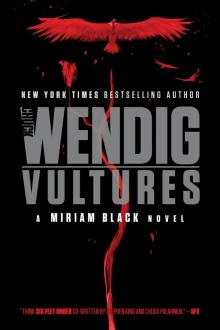 Vultures
Vultures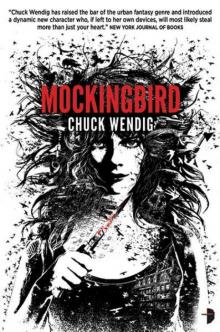 Mockingbird
Mockingbird Wanderers
Wanderers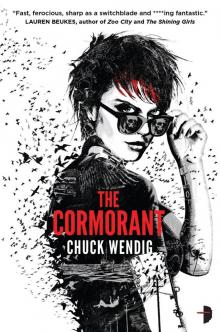 The Cormorant
The Cormorant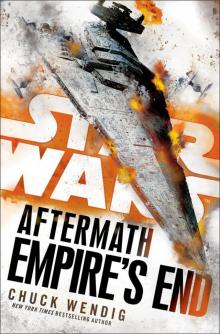 Empire's End: Aftermath (Star Wars)
Empire's End: Aftermath (Star Wars)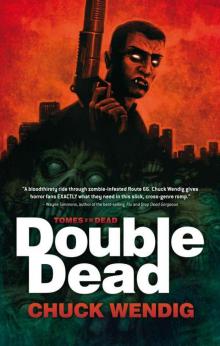 Double Dead
Double Dead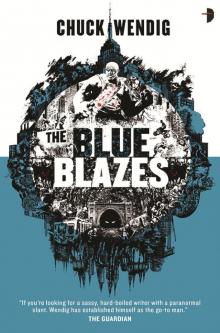 The Blue Blazes
The Blue Blazes 250 Things You Should Know About Writing
250 Things You Should Know About Writing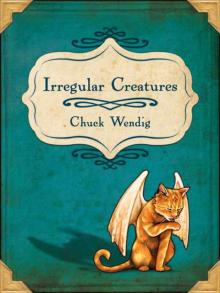 Irregular Creatures
Irregular Creatures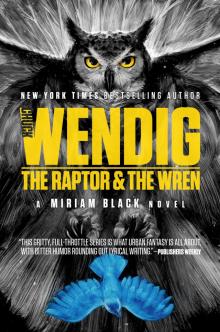 The Raptor & the Wren
The Raptor & the Wren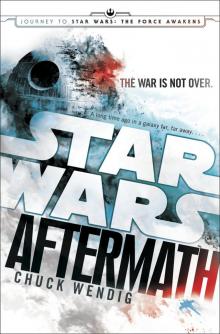 Aftermath: Star Wars
Aftermath: Star Wars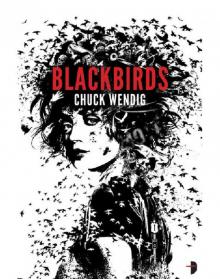 Blackbirds
Blackbirds The Hunt
The Hunt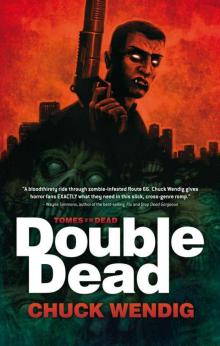 Tomes of the Dead (Book 1): Double Dead
Tomes of the Dead (Book 1): Double Dead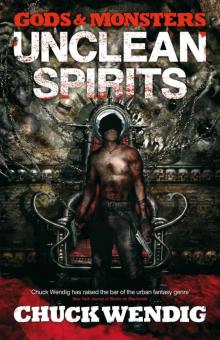 Gods and Monsters: Unclean Spirits
Gods and Monsters: Unclean Spirits The Harvest
The Harvest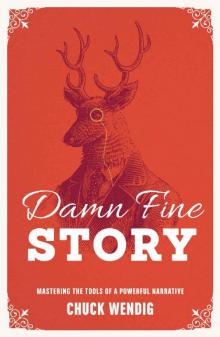 Damn Fine Story: Mastering the Tools of a Powerful Narrative
Damn Fine Story: Mastering the Tools of a Powerful Narrative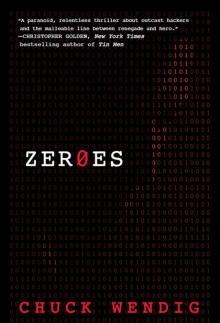 ZerOes
ZerOes Thunderbird
Thunderbird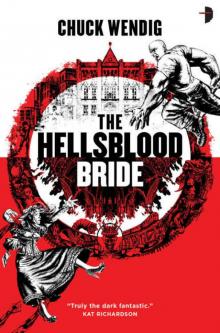 The Hellsblood Bride
The Hellsblood Bride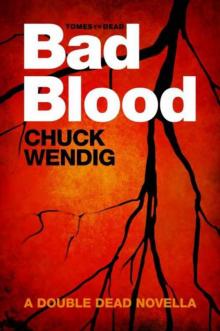 Double Dead: Bad Blood
Double Dead: Bad Blood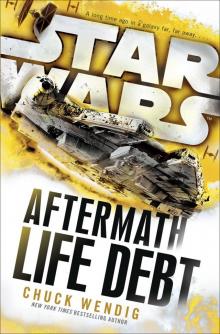 Life Debt
Life Debt